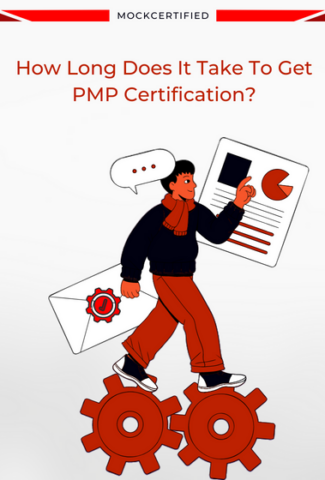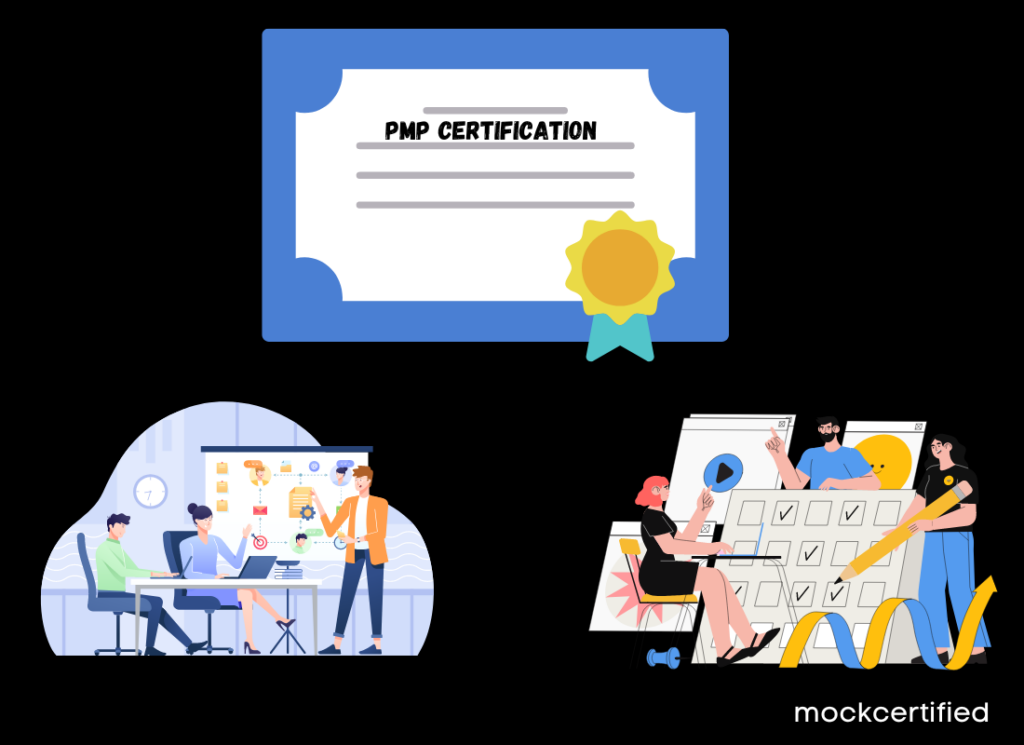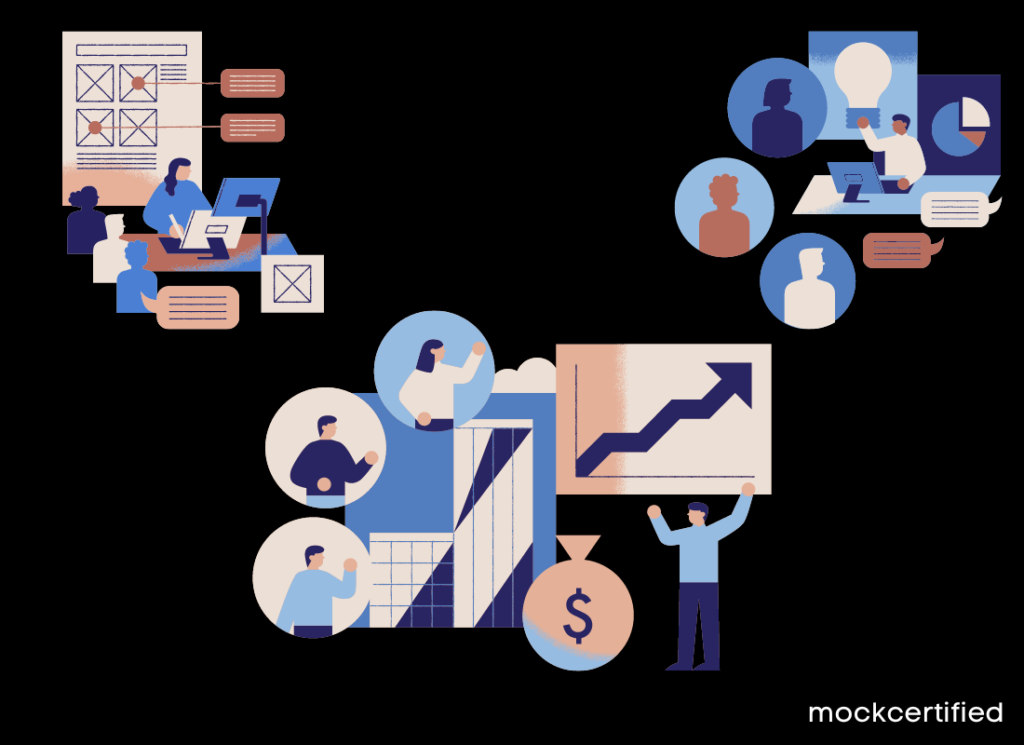
Table of Contents
Introduction
The Project Management Professional (PMP) certification is for you if project management is something you’re thinking about as a profession.
It will greatly increase your prospects and open doors to new opportunities in many sectors.
It is recognized globally and is highly regarded in the field of project management.
However, many aspiring professionals wonder how long does it take to get PMP certification and what factors can influence the timeline.
In this blog, we are going to examine the process of obtaining PMP certification and provide insights on how long does it take to get PMP certification.
What is PMP Certification?

PMP certification is an industry-recognized credential offered by the Project Management Institute (PMI).
It validates an individual’s knowledge and skills in project management and demonstrates their ability to lead and direct projects effectively.
PMP certification is based on PMI’s framework, which encompasses project management best practices and guidelines.
Know the highly-demanded IT certifications in the industry right now!
Importance of PMP Certification

PMP certification holds significant importance in the field of project management. It enhances your credibility as a project manager and increases your chances of landing lucrative job opportunities.
PMP-certified professionals are known for their ability to handle complex projects, mitigate risks, and deliver successful outcomes.
Learn the differences between all the project management certifications.
The certification not only validates your skills but also showcases your commitment to continuous learning and professional growth.
Eligibility Criteria
To be eligible for PMP certification, candidates must fulfill certain requirements set by PMI. These include:
A secondary degree (high school diploma, associate’s degree, or global equivalent) with a minimum of five years of project management experience, including 7,500 hours leading and directing projects, and 35 hours of project management education.
OR
A minimum of three years of project management experience, comprising 4,500 hours of project leading and directing, and 35 hours of project management education, along with a four-year degree (a bachelor’s degree or international equivalent).
PMP Exam Structure
PMP Exam Overview 2025
Exam Format and Timing
Exam Format
- 180 Questions
- Types of Questions:
- Multiple-choice
- Multiple responses
- Matching
- Hotspot
- Fill-in-the-blank
Timing
- 230 Minutes
- 10-Minute Breaks
Question Breakdown
Details
- 42% People: Leadership, team management, conflict resolution.
- 50% Process: Planning, executing, and risk control.
- 8% Business Environment: Strategy, compliance, and governance.
The PMP exam is a comprehensive assessment of an individual’s project management knowledge and skills.
It consists of 200 multiple-choice questions that cover various aspects of project management, including initiation, planning, execution, monitoring and controlling, and closing.
The exam duration is four hours, and it is conducted in a proctored environment.
Common Difficulties Faced During PMP Certification

- Feeling overwhelmed due to vast amount of study material.
- Balancing PMP preparation with work and personal commitments.
- Difficulty in understanding complex project management concepts.
- Struggling with time management during study sessions.
- Feeling anxious about the PMP exam format and level of difficulty.
We will be discussing possible ways to overcome these difficulties further in the blog.
PMP Exam Preparation
Preparing for the PMP exam requires diligent study and commitment. It is recommended to create a study plan and allocate sufficient time for each knowledge area.
Several resources are available to aid in exam preparation, such as study guides, online courses, practice exams, and study groups. Familiarizing yourself with the PMBOK® Guide (Project Management Body of Knowledge) is essential, as it is the primary reference for the exam.
Average Time Required to Prepare for PMP Certification
The time required to prepare for PMP certification varies from individual to individual.
However, factors such as prior experience, familiarity with the subject matter, and available study time can significantly influence the preparation duration.
To properly prepare for the test, it might often take three to six months of committed study.
PMP Certification Practice Exams Free
Preparing for the PMP exam can feel overwhelming, but practicing with the right tools makes a huge difference. If you’re looking for free resources, check out MockCertified.
It offers 200 multiple-choice questions specifically designed for PMP aspirants. What’s great? If you score 75% or higher, it’s a good sign that you’re exam-ready.
For a more personalized approach, MockBuddy is another fantastic tool. It allows you to focus on specific topics by generating MCQs tailored to your needs.
Plus, you can save questions for later to revise at your own pace. Whether you’re brushing up on weak areas or diving deep into specific sections, MockBuddy has you covered.
PMP Certification Training Free
Regarding PMP certification, quality training doesn’t always have to come with a hefty price tag. Several platforms provide free PMP training resources to help you get started.
While these may not be as comprehensive as paid courses, they’re perfect for building foundational knowledge and understanding the basics of project management.
Combine these free resources with practice exams like MockCertified or MockBuddy for a solid prep strategy.
Do PMI Mail the PMP Certificate?
Wondering if PMI mails your PMP certificate? PMI doesn’t send a physical certificate by default. Once you pass the exam, you’ll receive a digital certificate that you can download and print.
But if you’d like an official hard copy, you can request one through your PMI account (additional charges may apply). So, whether you prefer to frame it or keep it digital, PMI gives you both options!
How Long does it take to get PMP certification?
We have arrived at the main question: “How long does it take to get PMP certification?”
To become PMP certified, it typically takes on average 10–15 weeks, with part-time study of 3–4 hours. Take the test now, once you score an 85 on this one, you will know that you’re ready!

Several factors can impact on how long does it take to get PMP certification. They are:
Prior Experience: Professionals with prior project management experience may have a head start in their PMP journey. Their familiarity with project management concepts and practices can reduce the time needed for study and comprehension.
Available Study Time: The amount of time individuals can dedicate to PMP exam preparation greatly affects the overall timeline. Those who can allocate more hours per week for focused study sessions can expedite the preparation process.
Learning Style: Different individuals have different learning styles. Some may grasp concepts quickly, while others may require more time for comprehension and retention. Understanding your learning style can help tailor your study approach accordingly.
Study Resources: The availability and quality of study resources play a significant role in exam preparation. Utilizing comprehensive study materials, practice exams, and interactive learning tools can enhance understanding and streamline the learning process.
Tips to Expedite the PMP Certification Process

While the time required for PMP certification largely depends on individual circumstances, the following tips can help expedite the process:
Create a Study Plan: Develop a structured study plan that outlines the topics to cover and allocates dedicated study time. Breaking down the syllabus into manageable sections and setting realistic goals can boost productivity.
Utilize Available Resources: Leverage study guides, online courses, and practice exams to deepen your understanding of project management concepts. Participating in study groups or forums can also provide additional insights and support.
Take Practice Exams: Practice exams help familiarize you with the exam format and assess your knowledge gaps. Analyzing your performance in practice tests can guide further study and highlight areas that need improvement.
Focus on Weak Areas: Identify the knowledge areas where you feel less confident and devote extra time to studying those topics. Strengthening your understanding in these areas will contribute to overall exam readiness.
Maintain Consistency: Consistency is key in exam preparation. Establish a regular study routine and adhere to it. Avoid procrastination and ensure you allocate sufficient time each week to progress steadily toward your goal.
PMP Exam Application Process

Once you feel adequately prepared, the next step is to submit your PMP exam application to PMI.
The application requires details about your project management experience, education, and contact information.
PMI reviews the application and typically provides approval within a few days. Once approved, you can proceed to schedule your exam.
Scheduling the PMP Exam
After receiving approval, you can schedule your PMP exam through PMI’s designated testing centers.
It is advisable to select a suitable date that allows for additional study time, if needed.
The exam centers offer flexibility in choosing the most convenient time and location for your exam.
PMP Exam Day Experience
Arrive at the testing facility early on the day of the exam to complete the appropriate check-in requirements.
You can use an on-screen calculator and a virtual notepad to do calculations and take notes throughout the computer-based test.
To ensure that you can answer all the questions within the allocated time, take your time, carefully study each question, and spend your time effectively.
Receiving PMP Certification
Now that you’ve done all the steps given above now comes the main question: how long does it take to get PMP certification?
Your exam results will be shown on the screen right away once the exam is completed. If you pass the exam, you will receive the official PMP certification within a few weeks.
The certification demonstrates your proficiency in project management and can be a significant boost to your career prospects.
Benefits of PMP Certification

Obtaining PMP certification offers several benefits to professionals in the field of project management:
Career Advancement: PMP certification enhances your professional credibility and can open doors to higher-level positions and increased earning potential. Many organizations prioritize hiring PMP-certified professionals for leadership roles.
Global Recognition: PMP certification is globally recognized and respected. It demonstrates your competence in project management according to industry standards and increases your marketability both nationally and internationally.
Expanded Network: Joining the ranks of PMP-certified professionals grants you access to a vast network of like-minded individuals. Engaging with other certified project managers through professional associations and networking events can provide valuable insights and career opportunities.
Professional Growth: The PMP certification process itself is a valuable learning experience. It equips you with in-depth knowledge of project management methodologies, best practices, and industry standards, fostering continuous professional growth.
Increased Project Success: PMP-certified professionals possess the skills and knowledge required to manage projects effectively. By applying proven project management techniques, they can deliver successful outcomes, meet objectives, and mitigate risks.
Conclusion
Obtaining PMP certification is a significant achievement for professionals in the project management field.
While the time required to earn the certification can vary, dedicating ample study time, utilizing available resources, and following a structured approach can expedite the process.
PMP certification offers numerous benefits, including career advancement, global recognition, an expanded professional network, and increased project success.
Can the duration of obtaining PMP certification be influenced by personal learning style or study methods?
Yes, individuals have different learning styles and study preferences. Some may excel with self-study using books and online resources, while others may prefer instructor-led training or interactive study groups.
Choosing a study method that aligns with your learning style can impact the duration of obtaining PMP certification by enhancing comprehension and retention of the exam material.
Can the duration of obtaining PMP certification be affected by changes in the exam format or content?
Yes, the Project Management Institute (PMI), which administers the PMP certification, periodically updates the exam content outline to reflect changes in the project management profession due to which it may take you more time to study and prepare for the new exam.
Can the duration of obtaining PMP certification be affected by external factors, such as work commitments or personal circumstances?
Yes, external factors, including work commitments, personal responsibilities, and unexpected events, can influence the duration of obtaining PMP certification. Keep an eye on these factors and plan your study schedule accordingly to maintain a balance between your professional and personal obligations.
Are there any accelerated or fast-track programs available to expedite the PMP certification process?
While there are no official accelerated programs for PMP certification, some training providers may offer intensive boot camps or crash courses that compress the study period into a shorter timeframe. However, it’s crucial to ensure that these programs provide comprehensive coverage of the exam content and allow sufficient time for understanding and retention of project management concepts.
Can the duration of obtaining PMP certification be extended if I fail the exam?
There is a waiting period of at least one month between exam attempts. Therefore, if you do not pass the exam, it may extend the overall duration of obtaining the PMP certification.



